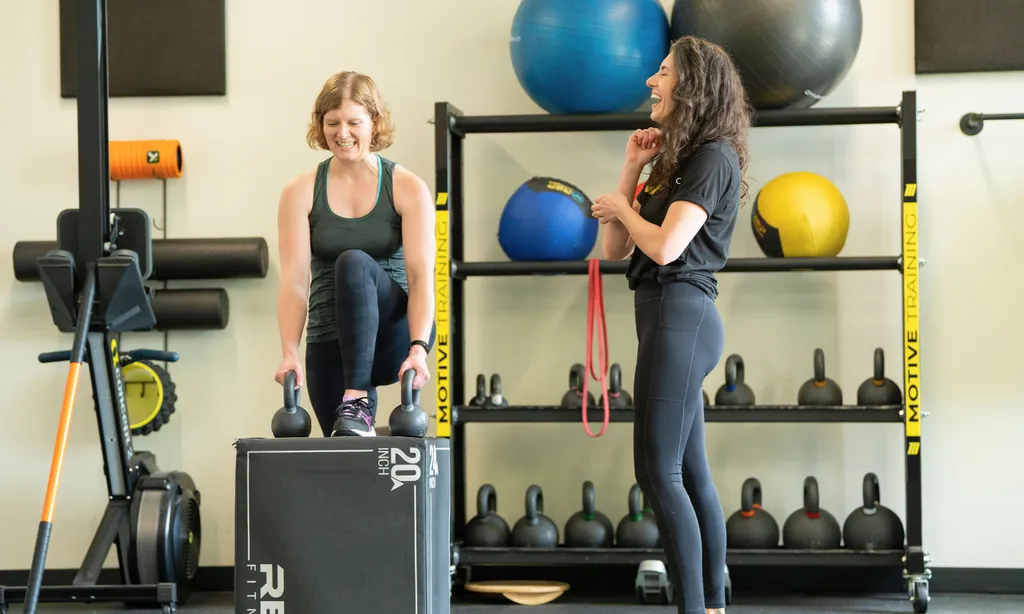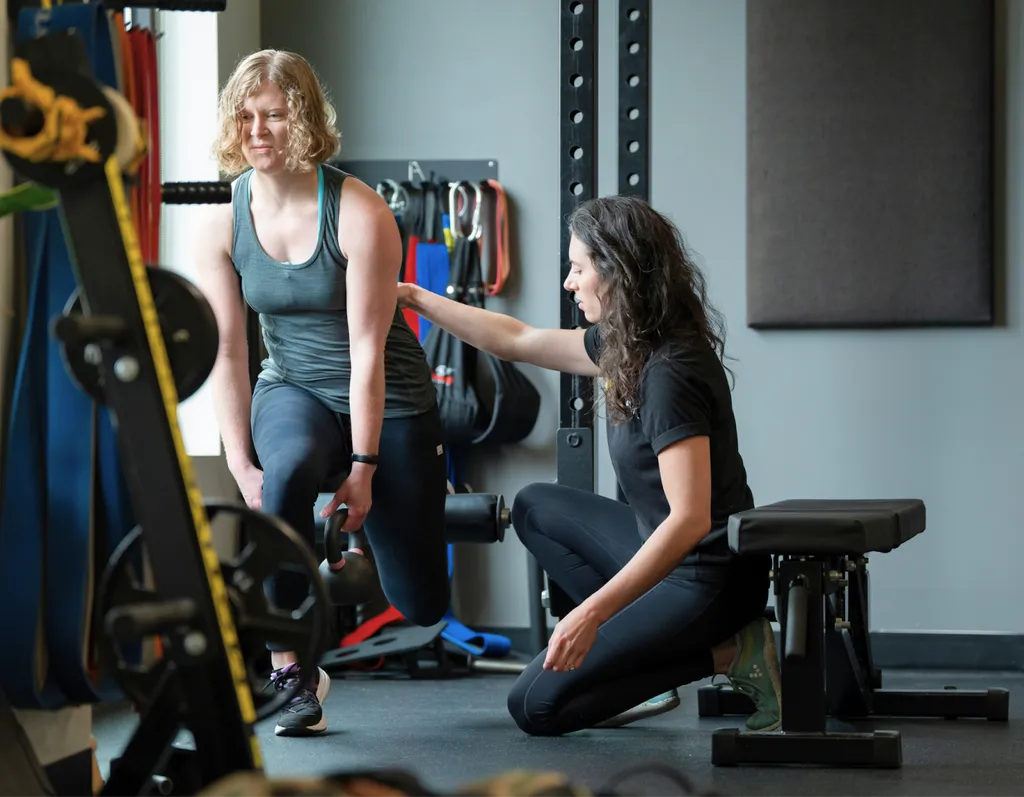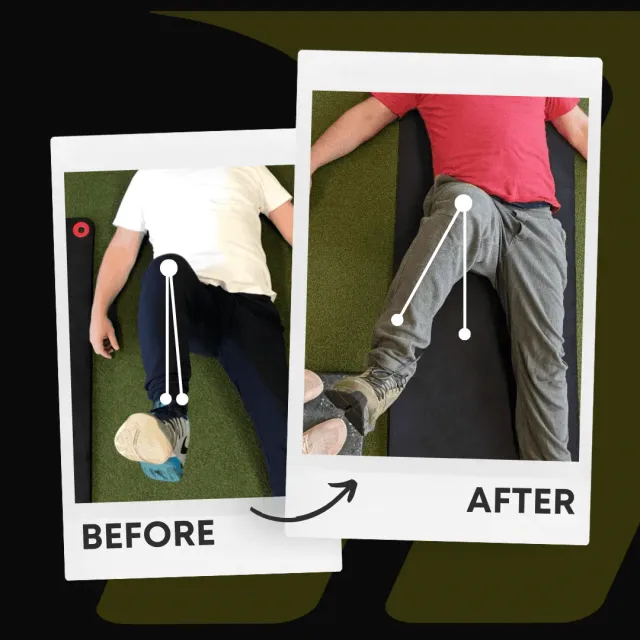Top Tips For What To Look for In A Fitness Trainer
July 25, 2024 | Fitness Trainer

Are you looking for the perfect fitness trainer? You’re in luck; we’re very experienced in this area, and even though we’re biased toward our gym at Motive Training, we’ll give you some tips on how to look for a fitness trainer in your area.
There are many factors to consider, such as certifications, experience, and coaching style. By actively participating in this process, you can ensure you find the best match for your fitness goals.
The Key Takeaways
- Look for trainers with recognized certifications (like FRC and ACE) and relevant degrees; this ensures they have the proper knowledge to provide safe and effective training.
- Ensure your trainer communicates well and sets SMART goals to help tailor the fitness plan to your needs.
- Consider the pros and cons of online vs. in-person training: online offers flexibility and cost savings, while in-person provides immediate feedback and hands-on adjustments.
Importance Of Certifications And Educational Background
The expertise of a trainer heavily relies on their certifications. Rigorous training is a prerequisite for certified personal trainers, providing them with fundamental knowledge in fitness, movement, exercise science, and coaching. This is crucial for delivering safe and effective training to clients. Moreover, trainers must engage in continuing education to keep their certifications current and stay updated with the latest fitness knowledge. This ensures they can handle various client needs and provide safe and efficient training.
A trainer’s educational background and relevant experience play a significant role in their professional qualifications. Having a solid foundation in exercise science, physical education, or kinesiology provides a deeper understanding of the physiological and biomechanical aspects of training. This expertise can be crucial in helping clients achieve their goals safely and effectively.
Everyone at Motive Training holds multiple degrees or is certified in one or more areas of Functional Range Conditioning.
Recognized Certification Programs
Selecting a qualified personal trainer involves considering certifications from reputable programs like:
- FRC (Functional Range Conditioning)
- ACE (American Council on Exercise)
- ACSM (American College of Sports Medicine)
- NSCA (National Strength and Conditioning Association)
These programs require passing comprehensive exams and often include online courses, ensuring that personal trainers are well-prepared to meet industry standards.
Relevant Degrees And Specializations
Although not mandatory, holding degrees in fields like exercise science, physical education, and kinesiology enriches a trainer’s understanding of the physiological and biomechanical aspects of training. Specializations like strength and conditioning or nutrition can further enhance a trainer’s ability to cater to specific client needs. This advanced knowledge often justifies a higher cost due to the specialized guidance provided.
Setting Clear Expectations And Goals
Setting clear expectations and goals is a crucial step in your fitness journey. By understanding your fitness goals and working with your trainer to set these goals, you can ensure they align with your abilities and lifestyle, making your fitness journey more achievable and motivating.
It’s paramount to define your expectations before hiring a trainer. It helps determine whether the trainer can meet your needs, whether for powerlifting basics, kick-start training, or staying consistent for the long haul. Additionally, using the SMART method (Specific, Measurable, Achievable, Relevant, Time-bound) helps set realistic goals that guide beacons, leading to tangible progress and sustained motivation.
SMART goals are an integral process at Motive Training. Every new client will go through a detail-oriented intake that allows us to narrow down goals and potential obstacles. We won’t leave a stone unturned in our process with helping you on your fitness journey.
Defining Your Fitness Goals
Meaningful fitness goals require introspection and intentionality to resonate with your personal aspirations. Factors like body type, age, and desired results play a crucial role in shaping your workout regimen. Breaking larger goals into smaller milestones fosters a sense of accomplishment and prevents feeling overwhelmed. This sense of success can be a powerful motivator, keeping you engaged in your fitness journey.
Regular check-ins with your trainer provide opportunities to assess progress and make necessary adjustments. A short upfront commitment can help ensure your trainer is a good fit before signing up for a longer period and setting big goals together. This approach keeps your fitness journey on track and aligned with your evolving needs, providing you with the support and guidance you need.
Communication And Availability
Clear communication with your trainer ensures your fitness plan is tailored to your evolving needs. It is important to find a trainer who is regularly available to accommodate your schedule multiple times per week. This will help you maintain discipline and consistency in your workouts.
Online trainers can provide 24-hour support through texts, calls, and social media, offering constant guidance and motivation.
Assessing Trainer’s Experience And Track Record
Just as experience is a powerful teacher, a fitness trainer with a proven track record can instill confidence and motivation in their clients. Success stories of past clients demonstrate a trainer’s capability to handle diverse challenges and help clients achieve their goals. Personal trainers with more experience are often better at understanding unique client needs and tailoring programs accordingly.
Looking into a trainer’s past success stories provides insights into their ability to help clients achieve their goals. Experienced trainers often attract clients through word of mouth and personal recommendations, highlighting their effectiveness and client satisfaction.
You won’t have to look far at Motive Training to see our client’s results; they are everywhere.
Years Of Experience And Client Testimonials
A trainer with at least one year of experience is likely to have developed and refined their training techniques. Client testimonials often highlight the trainer’s effectiveness in achieving tangible results and serve as a strong indicator of their competence.
Positive feedback from previous clients can build trust and show a trainer’s genuine interest in helping clients succeed.
Real-World Training Experience
Real-world training experience equips trainers with practical problem-solving skills and enhances their ability to adapt to individual needs. This hands-on experience allows trainers to handle diverse fitness challenges and tailor programs accordingly. Trainers with field experience develop critical soft skills such as clear communication and client motivation, making them more effective in their role.
Compatibility and Coaching Style

Your motivation and commitment to your fitness journey are greatly influenced by your trainer’s compatibility and coaching style. During your initial session with a potential trainer, assess whether their coaching style and personality match your preferences and learning style. This ensures a more enjoyable and effective training experience, which is key to your success.
Feeling inspired, empowered, and motivated after meeting a potential trainer indicates a good fit and partnership. Evaluating a trainer’s teaching style helps ensure it aligns with your learning preferences and personality. If the relationship with your trainer isn’t working, it’s important to make a change and try another coach.
A good personal training gym will have a staff with multiple personalities and styles to accommodate you. For instance at Motive Training ATX, we have a multitude of trainers from all walks of life and backgrounds that can help you and guide you toward your goals.
Initial Consultation And Trial Sessions
Trial training sessions provide an opportunity to:
- Evaluate the trainer’s expertise.
- See if their approach suits you.
- Observe how comfortable you feel working with the trainer.
- Determine if their communication style is effective. Building a bond with your trainer can help keep you engaged and motivated throughout your fitness journey. After having three sessions, consider specific questions related to the trainer’s qualifications, communication, and approach.
Adapting To Your Learning Style
Understanding your learning and training preferences helps the trainer tailor their approach to suit your needs. Whether you need:
- more hands-on guidance.
- space to take ownership.
- someone to cheer you on.
- someone to offer tough love.
Finding the right fit is crucial.
A good trainer should be able to adapt their coaching style to meet your individual learning needs, providing clear explanations and constructive feedback.
Identifying Red Flags In Personal Trainers
Spotting red flags in personal trainers can prevent potential issues and guarantee a pleasant experience. One major warning sign is whether a trainer focuses more on making you ‘look good’ than meeting your fitness goals. Trainers should customize workout plans based on pre-existing injuries and not follow a standard plan for everyone. A lack of customization is a clear indicator of a bad trainer.
A good personal trainer should correct improper forms and understand proper supplements, diet, and rest. Trainers who cannot provide this knowledge or exhibit unprofessional behavior, such as being consistently late or scrolling through their phones during sessions, should be avoided.
Let us go one step further and say that we don’t use phones in our gym during training sessions. It is company policy because it is a distraction to the trainer and the session itself. You’ll never have to worry about distractions at Motive Training.
Unrealistic Promises And Lack of Professionalism
Promising quick fixes and being unrealistic about the timeline for achieving fitness goals is a sign of a lack of professionalism. Trainers who want to sell supplements or show a lack of professionalism by being late or inattentive during sessions should be avoided.
Additionally, trainers who neglect warm-up and post-exercise stretching sessions indicate a need for proper knowledge.
Inappropriate Behavior And Poor Knowledge
Inappropriate behavior from a fitness trainer includes making uncomfortable comments, touching inappropriately, or failing to respect personal boundaries. Poor knowledge is another red flag; trainers who provide incorrect information on handling specific injuries or conditions or design one-size-fits-all workout plans without considering individual needs should be avoided.
If a trainer cannot explain the rationale behind an exercise or adapt it for your injury, their knowledge is likely insufficient.
Benefits Of Online Vs. In-Person Trainers
Unique benefits are offered by both online and in-person trainers. Online personal training provides flexibility and convenience, allowing you to work out on your own time and from any location. This can be particularly useful for those with busy schedules or those who travel frequently. Online trainers often offer more cost-effective options and access to various trainers and classes, making finding the right fit for your needs easier.
On the other hand, in-person training provides:
- Immediate, real-time feedback and correction during exercises, which can enhance technique and safety
- Face-to-face interaction with a trainer, increasing motivation and accountability
- Adaptation of workouts on the fly based on real-time observation of your performance and physical condition
These benefits of in-person training can significantly enhance your fitness journey.
Advantages Of Online Personal Training
Online personal training offers the flexibility to work out on time, accommodating busy schedules with pre-recorded videos and various session lengths. You can train with an online personal trainer from any location, making it ideal for those with unpredictable schedules or who travel frequently.
Online personal training can be more cost-effective than in-person training, with many programs offering cheaper rates and sometimes even free initial consultations. Additionally, online training often includes access to multiple trainers and a variety of classes, allowing for a broader range of expertise.
Benefits Of In-Person Training

In-person training offers the following benefits:
- Immediate feedback and correction of exercise form, which can be crucial for avoiding injuries
- Face-to-face interaction with a trainer which can increase motivation and accountability
- Personal rapport plays a significant role in the training process.
In-person trainers can adapt workouts on the fly based on real-time observation of your performance and physical condition. This hands-on assistance and correction provide a more personalized experience.
Cost Considerations and Value
Understanding what you’re paying for is crucial, given the wide range of personal training costs. Personal training rates can range from $50 to $150 per hour, depending on location, experience, and specific services offered. For example, the average cost of a personal trainer in North America as of April 2024 is $55-65 for an hour session. In higher-cost-of-living areas, prices can be significantly higher, sometimes exceeding $100 per session.
While cost is an important consideration, it’s crucial to evaluate the value you receive. A trainer’s reputation, demand, and popularity can influence their pricing. Personal trainers may offer package deals or discounted rates for multiple sessions, providing more value and a consistent training schedule. The type of training, such as one-on-one, group, or online coaching, can also impact the cost, with one-on-one sessions typically being more expensive.
At Motive Training, you’re looking at a bigger investment for sure. We price ourselves higher because we over deliver on our promise to help you.
Average Costs And What To Expect
General personal trainers charge between $30-$80 per hour, while strength and conditioning coaches typically cost $50-$100 per hour. Weight loss trainers usually charge between $40-$90 per hour. These rates can vary depending on the trainer’s experience, location, and the type of training they offer.
Evaluating Value Over Cost
When choosing a personal trainer, it’s essential to consider their expertise, experience, and the specific value they bring to your fitness journey, not just their hourly rate. Investing in a trainer who offers personalized guidance and has a proven track record can be more beneficial in the long run, ensuring you get your money’s worth and achieve your fitness goals effectively.
Ensuring a Personal Commitment to Fitness
The commitment of a personal trainer to fitness serves as a robust indicator of their dedication and comprehension of the challenges inherent in a fitness journey. Trainers who maintain their fitness set an example and can inspire clients to stay committed. Choosing a trainer who practices what they preach ensures they understand the dedication required for fitness and can offer better guidance based on their firsthand experience.
Ensuring your trainer has a vested interest in your success is crucial. A trainer who customizes workouts based on individual needs demonstrates a genuine interest in their client’s progress. This personalized approach can enhance motivation and accountability, helping you achieve your fitness goals more effectively. Trainers invested in client success often provide personalized advice and close monitoring to ensure progress.
Trainer’s Personal Fitness Habits
Inquiring about a trainer’s fitness routines can provide insight into their dedication and the methods they might use with clients. Trainers who are personally dedicated to fitness often have a deeper understanding of the challenges involved and can offer better guidance in your fitness journey.
Working with the right personal trainer is beneficial at any fitness level, and the best trainers often have many personal trainers themselves, as well as qualified personal trainers and fitness trainers.
Vested Interest in Your Success
A fitness coach who shows a vested interest in your success will personalize your exercise program and track your progress regularly to ensure you meet your goals, including helping you to lose weight. Trainers who encourage consistent healthy habits like adequate sleep and positive thinking can significantly enhance your fitness journey.
This commitment to your success ensures that you and your trainer are always on the same page, working towards your personal goals.
Summary
Finding the right fitness trainer involves more than picking someone with a good physique or a friendly demeanor. It’s about ensuring they have the right certifications, a solid educational background, and relevant experience to guide you safely and effectively on your fitness journey. Setting clear expectations and goals, assessing their track record, and ensuring compatibility in coaching style are all crucial steps in this process.
Be aware of red flags such as unrealistic promises, unprofessional behavior, and poor knowledge. Weigh the benefits of online versus in-person training based on your personal needs and preferences and consider the costs involved. Finally, ensure your trainer is personally committed to fitness and is interested in your success. With these tips, you can confidently choose a trainer to help you achieve your fitness goals and inspire you.
Frequently Asked Questions
Why are certifications necessary for a personal trainer?
Certifications are important for personal trainers because they ensure the trainer has the necessary knowledge for safe and effective training. This is essential for helping clients achieve their fitness goals.
How do I set realistic fitness goals with my trainer?
You can set realistic fitness goals with your trainer using the SMART method, which stands for Specific, Measurable, Achievable, Relevant, and Time-bound. This will help you establish clear and attainable objectives for your fitness journey.
What are some red flags to watch out for in a personal trainer?
If your personal trainer makes unrealistic promises, lacks professionalism, exhibits inappropriate behavior, or demonstrates poor knowledge about injuries or conditions, it’s a red flag, and you should consider finding a new trainer.
What are the benefits of online personal training?
The benefits of online personal training include flexibility, cost-effectiveness, and access to various trainers and classes, making it easier to find the right fit for your needs. It’s a great option to consider if you’re looking to improve your fitness routine.
How much does personal training typically cost?
Personal training typically costs between $50 to $150 or more per hour, depending on factors such as location, experience, and the services provided. Keep in mind that rates may vary.
Written by

Motive Training Staff
We’ll teach you how to move with purpose so you can lead a healthy, strong, and pain-free life. Our headquarters are in Austin, TX, but you can work with us online by signing up for KINSTRETCH Online or digging deep into one of our Motive Mobility Blueprints.




